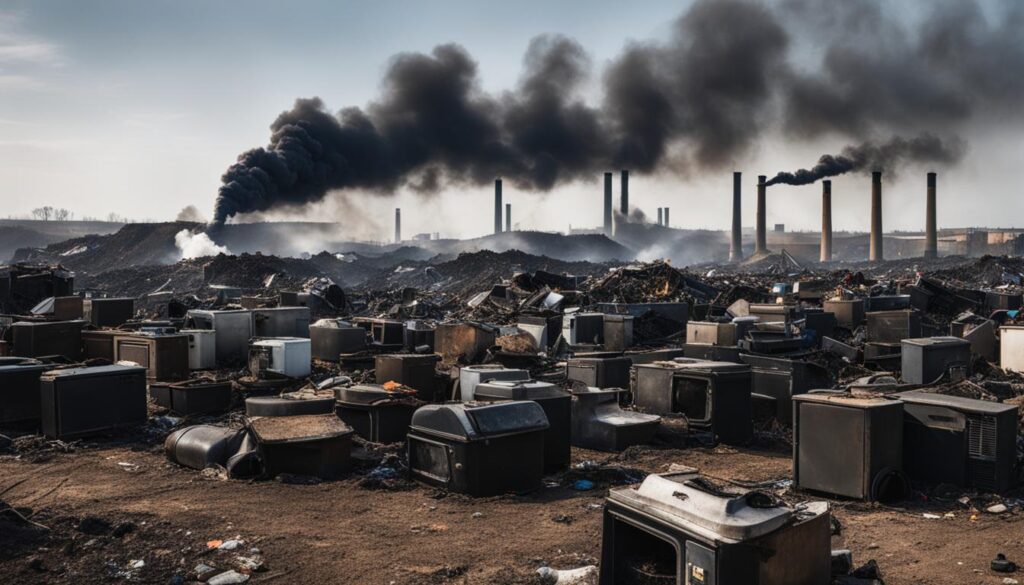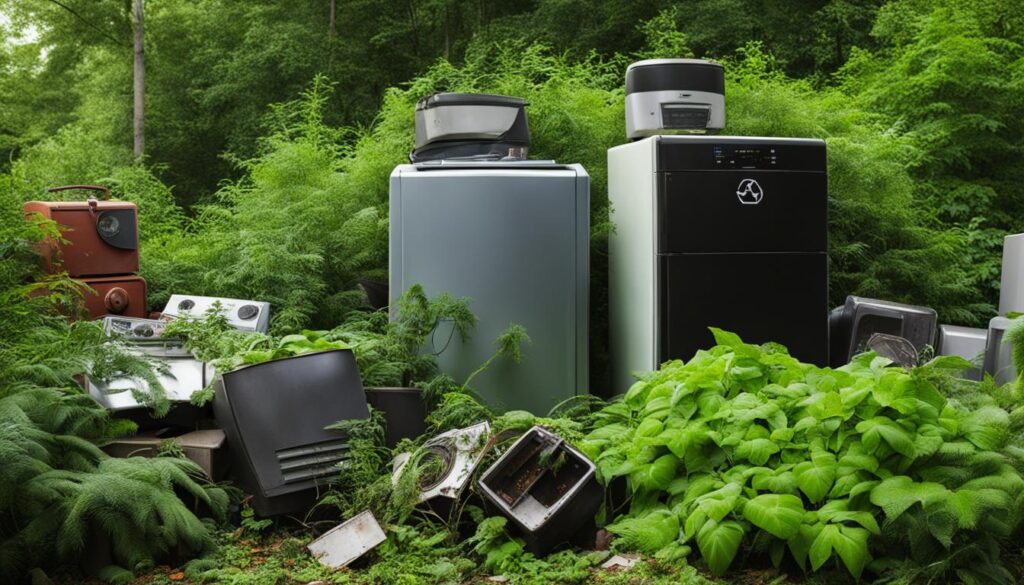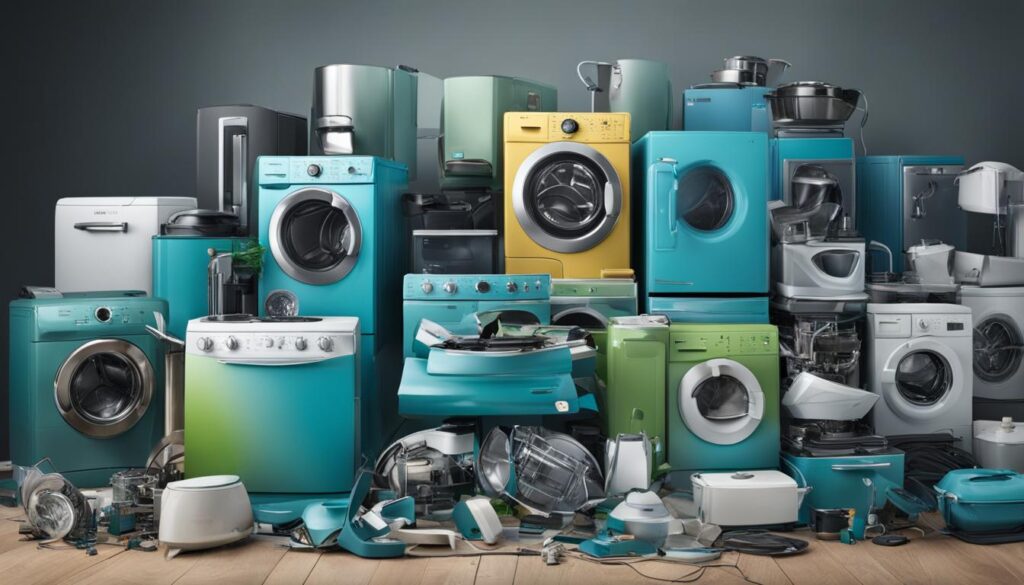
As our society continues to expand and grow, so does our use of appliances. From refrigerators to washing machines, these devices make our lives easier, but we must consider the environmental impact of their disposal. Improper appliance disposal can have negative effects on our world, but by using responsible methods, we can help preserve our planet for future generations.
Did you know that appliances contain hazardous materials and chemicals that can leach into the soil and water, causing damage to ecosystems and posing a risk to human and animal health? It’s crucial to understand the consequences of irresponsible appliance disposal to motivate us to take the right actions.
But it’s not all doom and gloom! Recycling, donating, and proper disposal at authorized facilities are all responsible methods to dispose of old appliances. By incorporating these methods into our lives, we can contribute to a cleaner and greener future.
Improper appliance disposal has a significant negative impact on our environment. Electronic appliances contain hazardous materials and chemicals such as lead, mercury, and cadmium that can leach into the soil and water, polluting our ecosystems and posing a threat to human and animal health.
According to Statistics Canada, “In 2016, 29.9 million tonnes of waste were generated in Canada, with 6.9 million tonnes (23%) of this waste coming from the residential sector.” Improper disposal of household appliances contributes to this waste, which increases the risk of environmental pollution and greenhouse gas emissions.
Some people may choose to dispose of appliances by dumping them in landfills, which leads to the release of harmful gases such as methane, a potent greenhouse gas that contributes to climate change. This issue highlights the importance of implementing proper disposal methods to safeguard our communities and future generations.

By disposing of appliances irresponsibly, we risk contaminating our soil, water, and air, which can lead to long-term environmental and health problems. It is essential to dispose of our appliances properly, considering the hazardous materials they contain.
In the next section, we will discuss the various responsible methods for appliance disposal that can help us reduce the environmental impact and contribute to a greener future.
At the end of an appliance’s lifespan, it’s essential to dispose of it in a responsible manner to minimize the negative impact on the environment. There are several ways to do this, including recycling, donating, and proper disposal at authorized facilities.
Recycling appliances is an excellent way to ensure that the materials they contain do not end up in landfills or contaminate the environment. Recycling facilities can salvage valuable materials such as copper, steel, and aluminum, which can be reused to make new products.
The recycling process involves dismantling the appliance to separate the different components and materials. Some facilities may also offer a pick-up service for larger appliances, while others may require you to drop them off at a facility.
To find local recycling programs and facilities in Canada, you can consult directories such as the Electronics Recycling Association or visit the website of the Recycling Council of Ontario.

Instead of disposing of a working appliance, donating it is a great way to extend its useful life and help someone else in need. Organizations such as Habitat for Humanity or local charitable organizations often accept gently used appliances.
Donating appliances not only helps those in need, but it also reduces waste and promotes a circular economy. Before donating, it’s essential to ensure that the appliance is in good working condition and meets the donation center’s requirements.
Donating appliances can also provide tax benefits, so be sure to ask for a receipt from the organization for your records.
If an appliance is beyond repair or is no longer in working condition, proper disposal at authorized facilities is necessary. These facilities are equipped to handle appliances’ hazardous components and ensure that they are disposed of safely and responsibly.
It’s important to note that appliances should not be disposed of with regular household waste. Check your local municipality’s guidelines for proper disposal or consult resources such as the Recycling Council of British Columbia or the Recycling Council of Alberta for guidance.
By following responsible methods for appliance disposal, we can minimize the environmental impact of disposing of our old appliances. Whether we choose to recycle, donate, or dispose of our appliances appropriately, each action we take can have a positive impact on our planet.
Recycling old appliances is not only an eco-friendly way to dispose of them, but it also helps to reduce the environmental impact of disposal. Recycling is an excellent solution that saves energy, reduces landfill waste, and conserves natural resources.
Through recycling, we can salvage valuable materials such as metal, glass, and plastic and reuse them in the production of new appliances. This process significantly reduces the need for virgin materials and minimizes the environmental impact of mining and extraction.
Our collective efforts towards recycling appliances and other electronics can make a positive impact on our environment. Together, we can create a greener future by reducing greenhouse gas emissions and conserving resources.
The recycling process for appliances involves several steps to ensure that the materials are appropriately handled and recycled. Once the appliance is collected, it is transported to a recycling facility where it is disassembled.
The recyclable materials, such as metal, glass, and plastic, are then separated and sorted to be reused in the production of new appliances or other products. The hazardous materials, such as refrigerants and mercury, are extracted and properly disposed of to ensure safety.

Recycling appliances helps to conserve resources such as energy and water. It also helps to reduce greenhouse gas emissions that contribute to climate change. By recycling our appliances, we can make a significant impact on our environment while also supporting the development of a sustainable, circular economy.
Recycling appliances is becoming increasingly accessible in Canada, with many local programs and facilities available to help you properly dispose of your old appliances. Municipalities and provinces across Canada offer recycling programs, and many retailers have take-back programs that accept old appliances for recycling.
For example, the Ontario Electronic Stewardship program is a provincial program that encourages the responsible disposal of electronic waste, including appliances. The program works with municipalities and retailers to provide free drop-off locations and pick-up services for residents across Ontario.
Other programs, like the Recycle My Electronics program in British Columbia, are designed to make recycling appliances and electronics easy and convenient for residents. The program accepts a wide range of electronics and provides free drop-off locations across the province.
By taking advantage of these programs and facilities, we can ensure that our old appliances are recycled responsibly, minimizing their impact on the environment and supporting a greener future for Canada.
Did you know that donating appliances not only helps those in need, but it’s also an environmentally friendly solution? By extending the lifespan of appliances, we reduce the amount of waste sent to landfills and promote a circular economy.
Donating appliances has numerous benefits. First, it helps those who may not have the financial means to purchase new appliances. Second, it reduces the amount of waste generated by disposing of old appliances. Third, it promotes the reuse of appliances, which is essential for creating a sustainable and circular economy.
If you’re interested in donating appliances, many local charities and non-profit organizations accept them. The Salvation Army and Habitat for Humanity ReStores are two examples of organizations that accept donated appliances. Doing a quick online search or asking around your community can help you find a suitable donation center.
Donating appliances helps reduce the carbon footprint of the manufacturing process that would have taken place if the recipient has to buy a brand-new appliance. This helps reduce the amount of waste generated by the manufacturing process, reducing the environmental impact of the appliances.
With just a little effort, we can help others and promote environmental sustainability by donating our working appliances to those in need. Let’s work together to create a greener future!
Proper disposal of old appliances is important because improper disposal can have a negative environmental impact. Appliances contain hazardous materials and chemicals that can pollute ecosystems and pose risks to human and animal health.
Improper appliance disposal can lead to soil and water contamination, which can harm plants, animals, and humans. It contributes to pollution and increases the strain on natural resources.
The responsible methods for appliance disposal include recycling, donating, and proper disposal at authorized facilities. These methods help minimize waste and reduce the environmental impact of appliance disposal.
Recycling appliances allows for the recovery and reuse of valuable materials, reducing the need for new resources. It conserves energy, reduces greenhouse gas emissions, and helps create a more sustainable and circular economy.
Donating appliances allows them to have a second life and helps individuals and families in need. It promotes reuse, reduces waste, and supports a more sustainable and socially responsible approach to resource management.